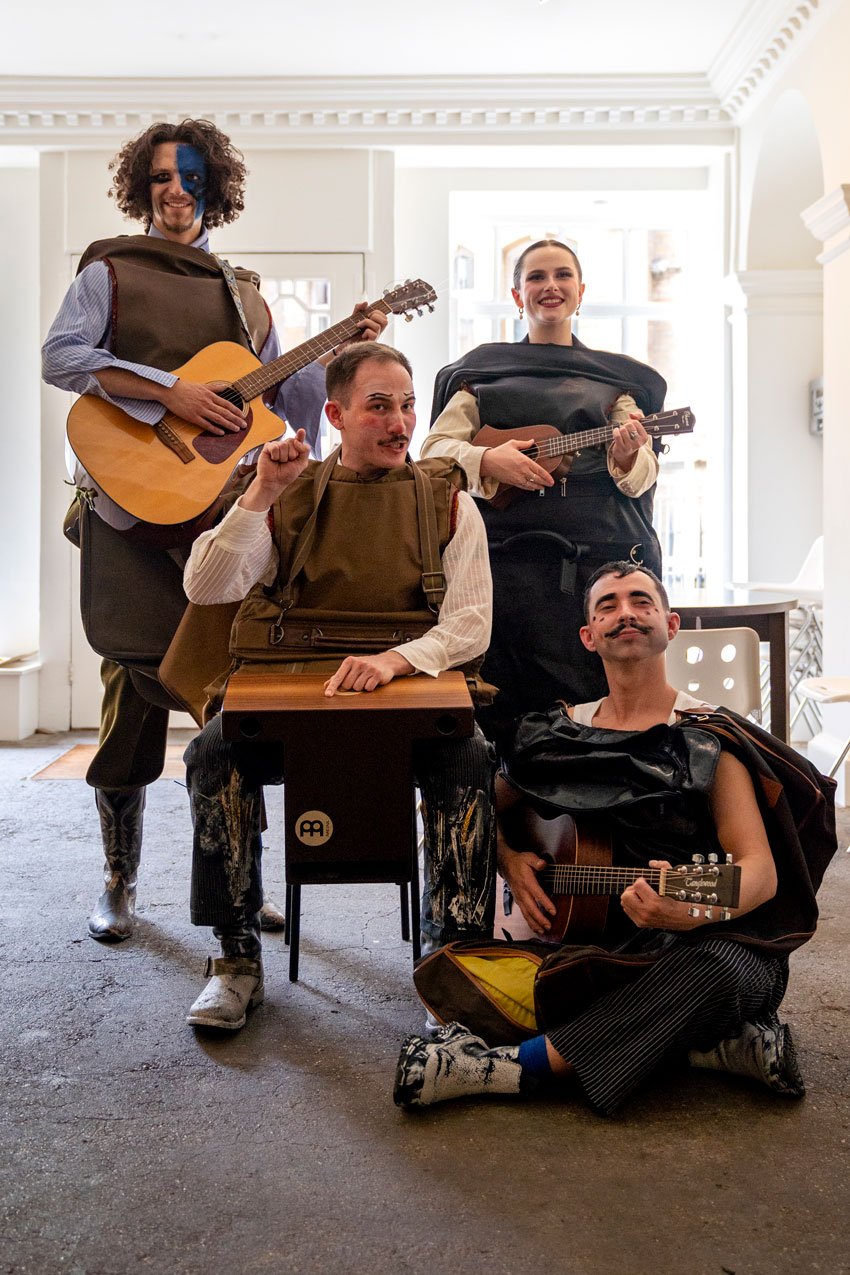
August 2024
Notes from London
brecht: fragments at Raven Row
Sascha Behrendt
If one wants to be jolted out of one’s usual, comfortable way of seeing art, then Raven Row’s recent exhibition will confound, unsettle, and do the job.
In this luxuriously unusual show, brecht:fragments shares rare excerpts from the Berlin archives of avant-garde dramatist and poet Bertolt Brecht, alongside twice daily live performances of his experimental plays from 1924 to 1931.
Born in Germany in 1898, Brecht experienced the societal upheavals of World War I and II. He fled the Nazis after the Reichstag burnt down, living in exile in Denmark, Sweden, and Finland before traveling via Russia, to California. He ended his final years in the German Democratic Republic, his work feted in Paris and London, more than the GDR.
An artist-intellectual who wrote poems daily, Brecht sought to combine through his Epic Theatre, both Marxist politics, and culture, using the art of theatre entertainment as a Trojan horse to provoke and engage public audiences into thinking about deeper societal issues and inequalities. His goal was to ‘make the familiar strange’ (Verfremdung) to disrupt the viewer’s passive, consuming relationship towards what they saw, into one of critical inquiry and new ideas.
Raven Row presents in glass cases and on walls, fragments of Brecht's newspaper collages, notes, and photographs that reveal the obsessive methodology behind his work. Photos of a fierce, proud head-scarfed young folk woman, are alongside Renee Falconetti as Jean of Arc, a child asleep on the father’s shoulder, mugshots of murderers, Hitler’s physical stances, or a lavish illustration from the epic 16th c Persian Shahnama (Book of Kings). All were meticulously pasted by Brecht onto paper sheets to record gestures, body language, and faces as sources of inspiration. Brecht utilised physical actions, rather than just words alone, to communicate his ideas.
Exhibition view, brecht: fragments, Raven Row, 2024, Photograph by Marcus Leith
Detail: BBA 0277:037, brecht: fragments, Courtesy the Bertolt Brecht Archive, Akademie der Künste, Berlin and Raven Row, 2024
At Raven Row, actors performed fragments from four of his plays, while roaming around the gallery. I discovered, during these 90 minutes, that Brecht’s work was funny and absurd; the actors were purely ‘signifiers’ for ideas, not actual embodiments of real people.
Die Sinflut (The Flood) a play applicable to our current environmental crisis, was dramatized crammed on the stairs, with the audience as participants and witnesses to disaster. In Fleischhacker, actors outlined the shady dealings of Stock Futures wheat markets, with costume bullheads and an electric piano, while we were shooed from room to room.
Ensemble and solo singing, and direct speech disrupted any lulled, audience rapture. The actors were superb, bringing carefully calibrated intensity and comic physical flourishes to the ‘characters’ they represented. Der Brotladen (The Breadshop) the most enjoyable play, sketched out a tale of economic exploitation amongst rising inflation with a lying baker, his desperate worker (homeless mother) a shifty landlord, and a preachy Salvation Army girl.
brecht: fragments performance, Raven Row, 2024, Photographer: Anne Tetzlaff
brecht: fragments performance, Raven Row, 2024, Photographer: Anne Tetzlaff
Like modern fables for adults, but not following the rules, Brecht's plays deliberately stop the spectator from being carried along, hypnotized by the story. Instead, unfair situations and relationship twists are emphasized in hilarious dramatic form, but through the distancing effects of caricature, one cannot emotionally attach to the protagonists. Watching them, I was both moved and discombobulated, because my senses and expectations were not being met. Genres were subverted and I had to think why.
Brecht hoped future artists would recreate and re-construct his works as needed. Here, in brecht: fragments, director and curator Phoebe von Held, and co-curators Tom Kuhn, Alex Sainsbury and Iliane Thiemann, intertwine Brecht’s aesthetics as visuals, text, and live plays, to fulfil that desire.
The show also makes one pause and consider the times we are in. Brecht wanted to encourage viewers to develop critical thinking, to ‘make the familiar strange again.’ As we wrestle with issues of disinformation and polarised politics, accelerated by social media and AI, his attempts through art, to get individuals to wake up and critically question how they think and want to live, seem so prescient.
I left, grateful, that Raven Row can afford and has the inclination, to put on odd, profound, unfashionable shows like this, when few others dare. I enjoyed being shaken up.
brecht: fragments performance, Raven Row, 2024, Photographer: Anne Tetzlaff
brecht: fragments
Raven Row
June 15 - August 18, 2024
Editor Sascha Behrendt is a writer with an in-depth knowledge of arts and culture in the US and UK. Interviews and profiles include artists Stan Douglas, Arthur Jafa, Sakiko Nomura, Walter Van Beirendonck, Francesca Woodman and Wolfgang Tillmans. She writes for the Sasson Soffer Foundation in New York, and is currently working on a comedy thriller novel.






